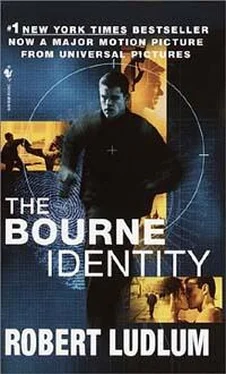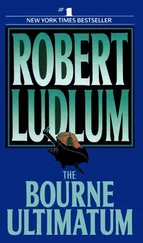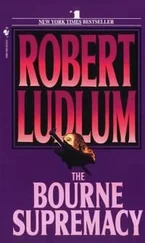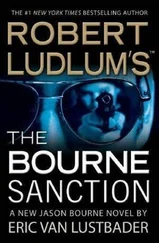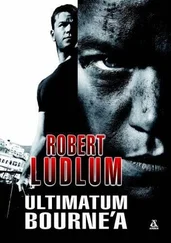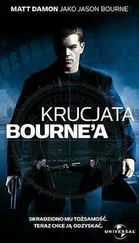“I know absolutely nothing! I merely followed the demands of the account. I am not involved!”
“Sorry. When I first talked to you, you said you wouldn’t confirm the sort of bank account I was talking about on the phone; you wouldn’t discuss business with someone you didn’t know. But twenty minutes later you said you had everything ready for me. That’s confirmation, isn’t it? Let’s go inside.”
The café was in some ways a miniature version of Zurich’s Drei Alpenhäuser. The booths were deep, the partitions between them high, and the light dim. From there, however, the appearances veered; the café on rue Madeleine was totally French, carafes of wine replacing steins of beer.
Bourne asked for a booth in the corner; the waiter accommodated.
“Have a drink,” said Jason. “You’re going to need it.”
“You presume,” replied the banker coldly. “I’ll have a whiskey.” The drinks came quickly, the brief interim taken up with d’Amacourt nervously extracting a pack of cigarettes from under his form-fitting overcoat. Bourne struck a match, holding it close to the banker’s face. Very close.
“Merci.” D’Amacourt inhaled, removed his cigarette, and swallowed half the small glass of whiskey. “I’m not the man you should talk with,” he said.
“Who is?”
“An owner of the bank, perhaps. I don’t know, but certainly not me.”
“Explain that.”
“Arrangements were made. A privately held bank has more flexibility than a publicly owned institution with stockholders.”
“How?”
“There’s greater latitude, shall we say, with regard to the demands of certain clients and sister banks. Less scrutiny than might be applied to a company listed on the Bourse. The Gemeinschaft in Zurich is also a private institution.”
“The demands were made by the Gemeinschaft?”
“Requests … demands … yes.”
“Who owns the Valois?”
“Who? Many—a consortium. Ten or twelve men and their families.”
“Then I have to talk to you, don’t I? I mean, it’d be a little foolish my running all over Paris tracking them down.”
“I’m only an executive. An employee.” D’Amacourt swallowed the rest of his drink, crushed out his cigarette and reached for another. And the matches.
“What are the arrangements?”
“I could lose my position, monsieur!”
“You could lose your life,” said Jason, disturbed that the words came so easily to him.
“I’m not as privileged as you think.”
“Nor as ignorant as you’d like me to believe,” said Bourne, his eyes wandering over the banker across the table. “Your type’s everywhere, d’Amacourt. It’s in your clothes, the way you wear your hair, even your walk; you strut too much. A man like you doesn’t get to be the vice-president of the Valois Bank without asking questions; you cover yourself. You don’t make a smelly move unless you can save your own ass. Now, tell me what those arrangements were. You’re not important to me, am I being clear?”
D’Amacourt struck a match and held it beneath his cigarette while staring at Jason. “You don’t have to threaten me, monsieur. You’re a very rich man. Why not pay me?” The banker smiled nervously. “You’re quite right, incidentally. I did ask a question or two. Paris is not Zurich. A man of my station must have words if not answers.”
Bourne leaned back, revolving his glass, the clicking of the ice cubes obviously annoying d’Amacourt. “Name a reasonable price,” he said finally, “and we’ll discuss it.”
“I’m a reasonable man. Let the decision be based on value, and let it be yours. Bankers the world over are compensated by grateful clients they have advised. I would like to think of you as a client.”
“I’m sure you would.” Bourne smiled, shaking his head at the man’s sheer nerve. “So we slide from bribe to gratuity. Compensation for personal advice and service.” D’Amacourt shrugged. “I accept the definition and, if ever asked, would repeat your words.”
“The arrangements?”
“Accompanying the transfer of our funds from Zurich was une fiche confidentielle—”
“Une fiche?” broke in Jason, recalling the moment in Apfel’s office at the Gemeinschaft when Koenig came in saying the words. “I heard it once before. What is it?”
“A dated term, actually. It comes from the middle nineteenth century when it was a common practice for the great banking houses—primarily the Rothschilds—to keep track of the international flow of money.”
“Thank you. Now what is it specifically?”
“Separate sealed instructions to be opened and followed when the account in question is called up.”
“‘Called up’?”
“Funds removed or deposited.”
“Suppose I’d just gone to a teller, presented a bank book, and asked for money?”
“A double asterisk would have appeared on the transaction computer. You would have been sent to me.”
“I was sent to you anyway. The operator gave me your office.”
“Irrelevant chance. There are two other officers in the Foreign Services Department. Had you been connected to either one, the fiche would have dictated that you still be sent to me. I am the senior executive.”
“I see.” But Bourne was not sure that he did see. There was a gap in the sequence; a space needed filling. “Wait a minute. You didn’t know anything about a fiche when you had the account brought to your office.”
“Why did I ask for it?” interrupted d’Amacourt, anticipating the question. “Be reasonable, monsieur. Put yourself in my place. A man calls and identifies himself, then says he is ‘talking about over four million francs.’ Four million. Would you not be anxious to be of service? Bend a rule here and there?”
Looking at the seedily elegant banker, Jason realized it was the most unstartling thing he had said.
“The instructions. What were they?”
“To begin with a telephone number—unlisted, of course. It was to be called, all information relayed.”
“Do you remember the number?”
“I make it a point to commit such things to memory.”
“I’ll bet you do. What is it?”
“I must protect myself, monsieur. How else could you have gotten it? I pose the question … how do you say it? … rhetorically.”
“Which means you have the answer. How did I get it? If it ever comes up.”
“In Zurich. You paid a very high price for someone to break not only the strictest regulation on the Bahnhofstrasse, but also the laws of Switzerland.”
“I’ve got just the man,” said Bourne, the face of Koenig coming into focus. “He’s already committed the crime.”
“At the Gemeinschaft? Are you joking?”
“Not one bit. His name is Koenig; his desk is on the second floor.”
“I’ll remember that.”
“I’m sure you will. The number?” D’Amacourt gave it to him. Jason wrote it on a paper napkin.
“How do I know this is accurate?”
“You have a reasonable guarantee. I have not been paid.”
“Good enough.”
“And as long as value is intrinsic to our discussion, I should tell you that it is the second telephone number; the first was canceled.”
“Explain that.”
D’Amacourt leaned forward. “A photostat of the original fiche arrived with accounts-courier. It was sealed in a black case, accepted and signed for by the senior keeper-of-records. The card inside was validated by a partner of the Gemeinschaft, countersigned by the usual Swiss notary; the instructions were simple, quite clear. In all matters pertaining to the account of Jason C. Bourne, a transatlantic call to the United States was to be placed immediately, the details relayed… Here the card was altered, the number in New York deleted, one in Paris inserted and initialed.”
Читать дальше
